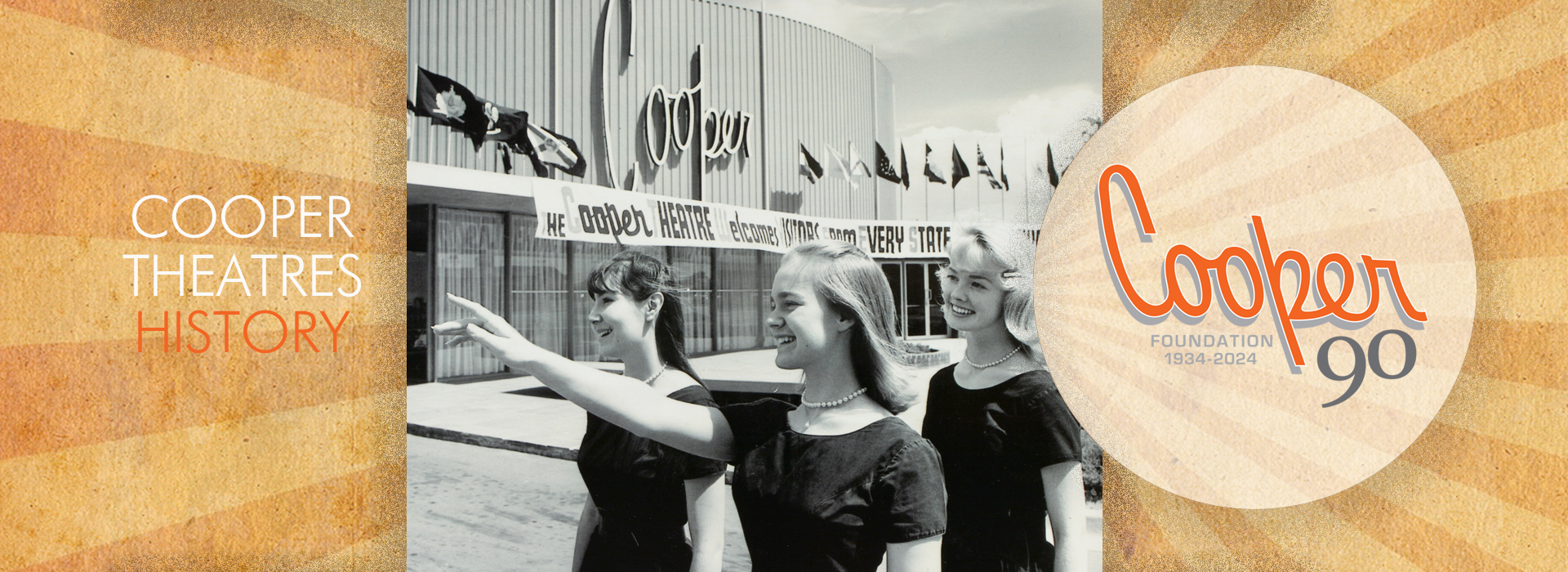


According to Ike Hoig, who started his career as an usher for Joe Cooper: “Of course he came up the hard way. One of his friends had a theater in Missouri, I believe it was Joplin, and he (Joe Cooper) came out and worked for him. He saved his money and put up (probably leased) a theater in Joplin.”
Joe Cooper began to buy and lease several more theaters and discovered that a “pool” of theaters had greater film buying power than a single movie house. So, he began assembling several partnerships with other individual theater owners, and then with two behemoths of the industry, Paramount Publix Theatres, and Warner Brothers Theatres. He eventually operated (owned or managed) 23 theaters in Oklahoma City, Oklahoma; Pueblo, Colorado Springs, Grand Junction, and Greeley, Colorado; Wichita, Kansas and in Lincoln, Nebraska.
(Ute Theater, Colorado Springs, CO)
The Ute Theater, built in 1935, was an ornate Art Deco theater adorned with Southwestern motifs and furnished with handmade items by local artisans. The Ute was also the center of an important lawsuit against racial discrimination filed by the NAACP in 1944.
https://www.cspm.org/cos-150-story/ute-theater/
A successful business owner, Mr. Cooper nevertheless weathered challenges due to his disability and discrimination. He lived in New York to allow for better negotiations with film distributors, and closely managed his businesses through the telephone, calling the city managers nightly for a report after the theaters closed. He periodically traveled by train to visit his properties, and because he was Jewish he had to have special arrangements made to stay in certain hotels.
At the Broadmoor Hotel in Colorado Springs, the theater manager recalled, “The arrangement was that Joe Cooper could not go down to the lobby and he had to take his meals in his room. That worked out fine for him because he could not be out during the day because of his eyes. The light bothered his eyes. He had to have a contract a half an inch from his eyes to read it. He and I would walk around Lake Broadmoor in the evenings discussing plans for the theaters.”
As the theater business prospered, Mr. Cooper made special connections in Lincoln, Nebraska after purchasing some properties there. He met leading business owners, some of whom became close friends and were among the first trustees when he established the Cooper Foundation in Lincoln in 1934.
Joe Cooper built the assets of the Cooper Foundation primarily by transferring most of his theater interests in 1943. When he died in 1946, the Cooper Foundation, a charitable institution, rather unconventionally became the operator of a multi-state chain of movie theaters.
From Mr. Cooper’s death on March 20, 1946 until the sale of the business on October 15, 1979, the Cooper Foundation owned and managed the Cooper Theatres. During that time we sold the Oklahoma City properties and expanded in Colorado and Minneapolis, Minnesota. In 1958, the Foundation purchased additional theater properties in Omaha, Nebraska, partially through a gift from owner Hermoine Goldberg, including the Dundee Theater.
(Dundee Theater, Omaha, NE)
In 1958, the Dundee Theater was acquired by Cooper Theatres and played mostly foreign movies until 1965, when it ran “The Sound of Music” for 118 weeks – the second-longest run at any movie theater, worldwide.
In the 1960s, the Cooper Cinerama Theatres ushered in a new, albeit temporary, era in movie theater development, operations and economics. Each theater had a huge screen, multiple projectors, vastly improved sound equipment, and more comfortable seats.
Moviegoer: “My family saw the premiere of the re-release of “Gone With the Wind” in 1967, blown up to 70mm! Ushers were dressed in Civil War uniforms and hoop skirts, and they handed us slick programs with technicolor stills of all the iconic scenes.”
Only reserved seating was available and there was one show a night, higher ticket prices, and higher priced concessions. Going to a film at a Cooper Cinerama theater became an event on the order of going to a Broadway show. For the opening of the Denver Cooper Cinerama, people came by train from the Western Slope of the Rockies to see How The West Was Won.
Although Cinerama itself was a short-lived technology, the innovative round theaters and huge curved screens in Denver, Minneapolis, and Omaha created an immersive experience for patrons for many years.
Moviegoer: “I saw Star Wars over and over at the Indian Hills in 1977 – it was the snazziest, most state of the art theater in the city at the time.”
Through the years of operating the theater business, the Foundation made grants in Lincoln and in communities where we had theaters. We hosted community celebrations through the theaters themselves, including special holiday events for children and older patrons, and donated portions of the ticket sales of big openings to charity.
Ultimately, tax law changed and as a private foundation the Cooper Foundation was unable to own and operate a for-profit business. The sale of the Cooper Theatres was finalized in 1979 and the proceeds went to build the Foundation’s endowment as Mr. Cooper’s deed of trust directed. At that time, about $3.1 million in grants had been made to organizations and educational institutions. Through Joe Cooper’s foresight in creating a perpetual fund, and through the stewardship of the board to grow the business and manage that endowment, today over $30 million has been granted to support the community in the areas of arts and humanities, civic and community engagement, education, the environment, and human services.

